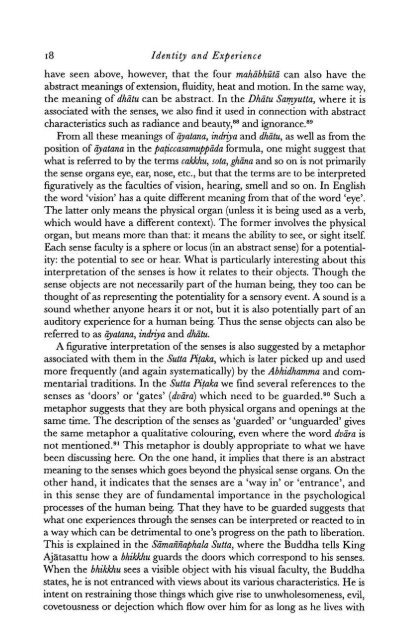Identity and Experience_Hamilton_1996
Identity and Experience_Hamilton_1996
Identity and Experience_Hamilton_1996
Create successful ePaper yourself
Turn your PDF publications into a flip-book with our unique Google optimized e-Paper software.
I 8<br />
<strong>Identity</strong> <strong>and</strong> <strong>Experience</strong><br />
have seen above, however, that the four mahibhuti can also have the<br />
abstract meanings of extension, fluidity, heat <strong>and</strong> motion. In the same way,<br />
the meaning of dhitu can be abstract. In the Dhitu Samyutta, where it is<br />
associated with the senses, we also find it used in connection with abstract<br />
characteristics such as radiance <strong>and</strong> beauty,88 <strong>and</strong> ignorance.89<br />
From all these meanings of iiyatana, indriya <strong>and</strong> dhitu, as well as from the<br />
position of qatana in the pa$ccasamuppiida formula, one might suggest that<br />
what is referred to by the terms cakkhu, soh, ghina <strong>and</strong> so on is not primarily<br />
the sense organs eye, ear, nose, etc., but that the terms are to be interpreted<br />
figuratively as the faculties of vision, hearing, smell <strong>and</strong> so on. In English<br />
the word 'vision' has a quite different meaning from that of the word 'eye'.<br />
The latter only means the physical organ (unless it is being used as a verb,<br />
which would have a different context). The former involves the physical<br />
organ, but means more than that: it means the ability to see, or sight itself.<br />
Each sense faculty is a sphere or locus (in an abstract sense) for a potentiality:<br />
the potential to see or hear. What is particularly interesting about this<br />
interpretation of the senses is how it relates to their objects. Though the<br />
sense objects are not necessarily part of the human being, they too can be<br />
thought of as representing the potentiality for a sensory event. A sound is a<br />
sound whether anyone hears it or not, but it is also potentially part of an<br />
auditory experience for a human being. Thus the sense objects can also be<br />
referred to as iiyatana, indriya <strong>and</strong> dhitu.<br />
A figurative interpretation of the senses is also suggested by a metaphor<br />
associated with them in the Sutta Fitaka, which is later picked up <strong>and</strong> used<br />
more frequently (<strong>and</strong> again systematically) by the Abhidhamma <strong>and</strong> commentarial<br />
traditions. In the Sutta Pitaka we find several references to the<br />
senses as 'doors' or 'gates' (dvira) which need to be guarded.g0 Such a<br />
metaphor suggests that they are both physical organs <strong>and</strong> openings at the<br />
same time. The description of the senses as 'guarded' or 'unguarded' gives<br />
the same metaphor a qualitative colouring, even where the word dvira is<br />
not menti~ned.~' This metaphor is doubly appropriate to what we have<br />
been discussing here. On the one h<strong>and</strong>, it implies that there is an abstract<br />
meaning to the senses which goes beyond the physical sense organs. On the<br />
other h<strong>and</strong>, it indicates that the senses are a 'way in' or 'entrance', <strong>and</strong><br />
in this sense they are of fundamental importance in the psychological<br />
processes of the human being. That they have to be guarded suggests that<br />
what one experiences through the senses can be interpreted or reacted to in<br />
a way which can be detrimental to one's progress on the path to liberation.<br />
This is explained in the Simalitiaphala Sutta, where the Buddha tells King<br />
Ajatasattu how a bhikkhu guards the doors which correspond to his senses.<br />
When the bhikkhu sees a visible object with his visual faculty, the Buddha<br />
states, he is not entranced with views about its various characteristics. He is<br />
intent on restraining those things which give rise to unwholesomeness, evil,<br />
covetousness or dejection which flow over him for as long as he lives with


